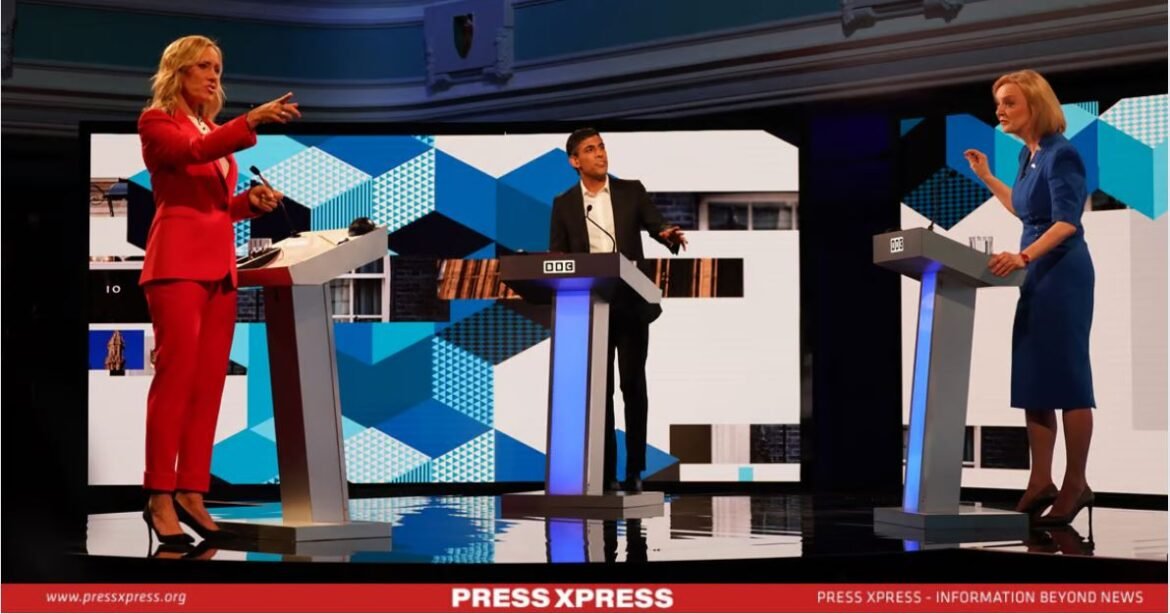Key Highlights:
- Amidst this controversy, Mr. Sunak pledged to eliminate stamp duty for first-time home buyers on properties up to £425,000
- Sunak essentially abandoned the policies upheld by Conservative administrations over the past decade, criticizing initiatives such as heat pumps
Rishi Sunak’s early departure from the D-Day commemorations on 7 June, Friday has sparked significant criticism from cabinet ministers. The atmosphere at Tory headquarters has been described as ‘funereal’. Penny Mordaunt, the Conservative Leader of the House of Commons, condemned the Prime Minister’s choice to return to the UK for a TV interview, labeling it ‘completely wrong’. Following backlash from the opposition and military members, Mr. Sunak issued an apology. A poll released on Friday afternoon indicated that nearly two-thirds of the British public found his decision ‘unacceptable’.

You can also read: Capital Gains Tax Set to Skyrocket to 30%!
In addition to Ms. Mordaunt, participants from various political parties, including the Conservatives, Labor, Liberal Democrats, Reform UK, the Greens, and Plaid Cymru, criticized Mr. Sunak’s actions.
An insider reported an unprecedented quiet at Conservative Campaign Headquarters (CCHQ) following the Prime Minister’s absence from the international memorial.
A disheartened Tory candidate remarked that Mr. Sunak’s actions made Theresa May’s 2017 campaign appear competent and suggested that a crossover with Reform UK now seems inevitable.

Amidst this controversy, Mr. Sunak pledged to eliminate stamp duty for first-time home buyers on properties up to £425,000. This announcement followed a heated BBC debate featuring 7 candidates, during which Rishi and Keir Starmer talked about taxes, migration, climate, and net zero.
So, what insights did we gain about Rishi Sunak and Keir Starmer as they faced off in the inaugural TV debate of the election campaign?
Starmer Misses Open Goal to Sink £2k Tax Myth
Starmer’s major misstep during the debate lay in his failure to effectively counter Sunak’s assertion regarding Labor’s purported £2,000 tax hike plan. This figure, sourced from Conservative costings alleging £38.5 billion in Labor spending commitments, has been vehemently refuted by Labor, who argue that these costings are founded on erroneous assumptions.
Throughout the debate, Starmer missed numerous opportunities to refute the £2,094 tax increase claim, even as Sunak reiterated it. When he eventually addressed it, his response was convoluted and failed to begin with a clear denial: ‘That’s not true’.
Labor’s election coordinator, Pat McFadden, was compelled to intervene via Twitter, stating unequivocally amidst the debate that “Rishi Sunak’s claims about Labor and tax are categorically untrue. Labor will not put up taxes on working people.”
The potential impact of Sunak’s claim cannot be understated; if it gains traction, it could prove damaging. This raises concerns about why Starmer did not promptly and directly challenge it with better preparation.

Migration Clash Heats Up Over Channel Crossings
The Prime Minister was questioned about the possibility of withdrawing the UK from the European Convention on Human Rights (ECHR) should his deportation policy to Rwanda prove ineffective. In 2022, flights carrying asylum seekers to Rwanda were halted due to legal challenges, prompting some members of the Conservative party to advocate for withdrawal from the ECHR.
Mr. Sunak responded that he would prioritize the security of the country in any such decision, emphasizing the importance of securing borders and national security over adherence to a foreign court’s rulings. However, he stopped short of committing to including a pledge to withdraw from the ECHR in the Tory manifesto.
Conversely, Sir Keir passionately defended the convention, expressing his desire for the UK to maintain its reputation as a respected global actor rather than becoming isolated. Interestingly, both their responses received rare applause from the studio audience.

Sunak Slams Tory Climate Policies, Calls Them ‘Costly Burdens’
Sunak essentially abandoned the policies upheld by Conservative administrations over the past decade, criticizing initiatives such as heat pumps, electric vehicles, and renewable energy—endeavors the Tories had invested heavily in promoting and legislating for. He argued that such measures would impose significant financial burdens, costing ‘thousands of pounds’ for each household.
Starmer also faced scrutiny on the climate issue following his party’s reversal, retracting a commitment to allocate £28 billion. However, unlike Sunak, Starmer articulated his party’s strategies for addressing the climate crisis, refraining from dismissing it as overly costly. He emphasized Labor’s primary commitment to achieving clean energy by 2030.
Finally, Debate Devolves into Insult-Fest
The tension between the two leaders reached remarkable levels, marked by constant interruptions and personal insults. Sunak had a slew of contentious allegations, including tax hikes of £2,000 and an amnesty for illegal migrants, which he aimed to pin on Starmer. However, Starmer’s strategy seemed to be to brush them aside rather than engage in rebuttal.
In retaliation, Starmer launched a significant assault on his opponent, accusing him of ‘betting against Britain’ during his early tenure at a hedge fund. Sunak didn’t refute the claim, instead doubling down by implying he preferred his current position over ‘defending extremists’, a veiled reference to Starmer’s past as a human rights lawyer.
Overall, the audience appeared to lean more favorably towards Starmer, particularly concerning matters of the economy and the NHS. Even when Sunak touted his flagship national service policy, the audience responded with laughter.
In the wake of Rishi Sunak’s premature departure from the D-Day commemorations, a storm of criticism has engulfed Tory headquarters, painting a somber atmosphere. As voices from across the political spectrum, including Tory stalwarts and opposition figures, unite in condemnation, the once-unassailable facade of Conservative unity appears increasingly fractured.
Against this backdrop, the inaugural TV debate between Sunak and Keir Starmer offered a glimpse into the contenders’ strategies and vulnerabilities. As the election campaign unfolds, the spotlight remains firmly fixed on Sunak and Starmer, their every move scrutinized under the unforgiving glare of public opinion.


